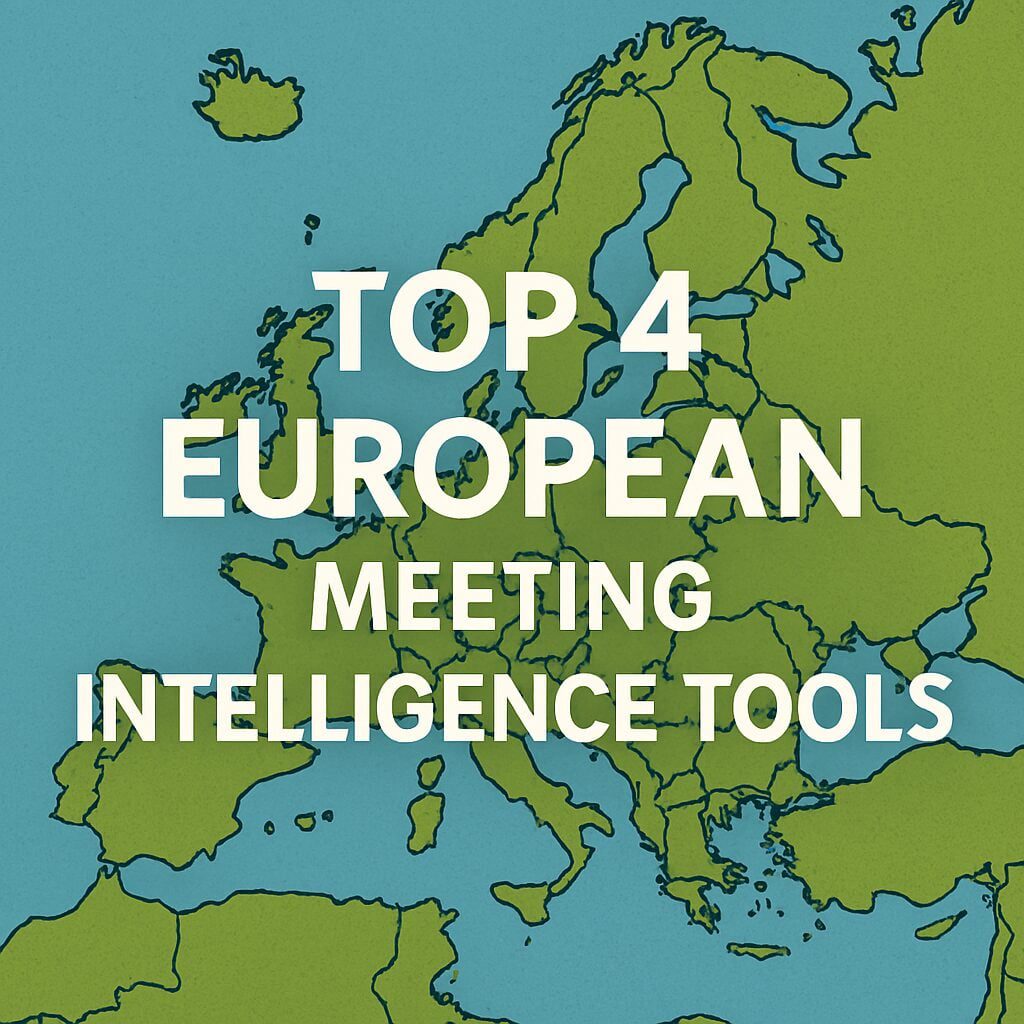MiiTel is a cloud-based IP phone solution and speech analysis tool, primarily used by Japanese call centers and telesales companies. However, there are some users that require a stronger global reach. For that, you might be better off with one of the MiiTel alternatives that we’re going to be looking at today.
Before we dive into the list though, let’s take a deeper dive into MiiTel itself. What does it do exactly?
MiiTel Review: What Is It?
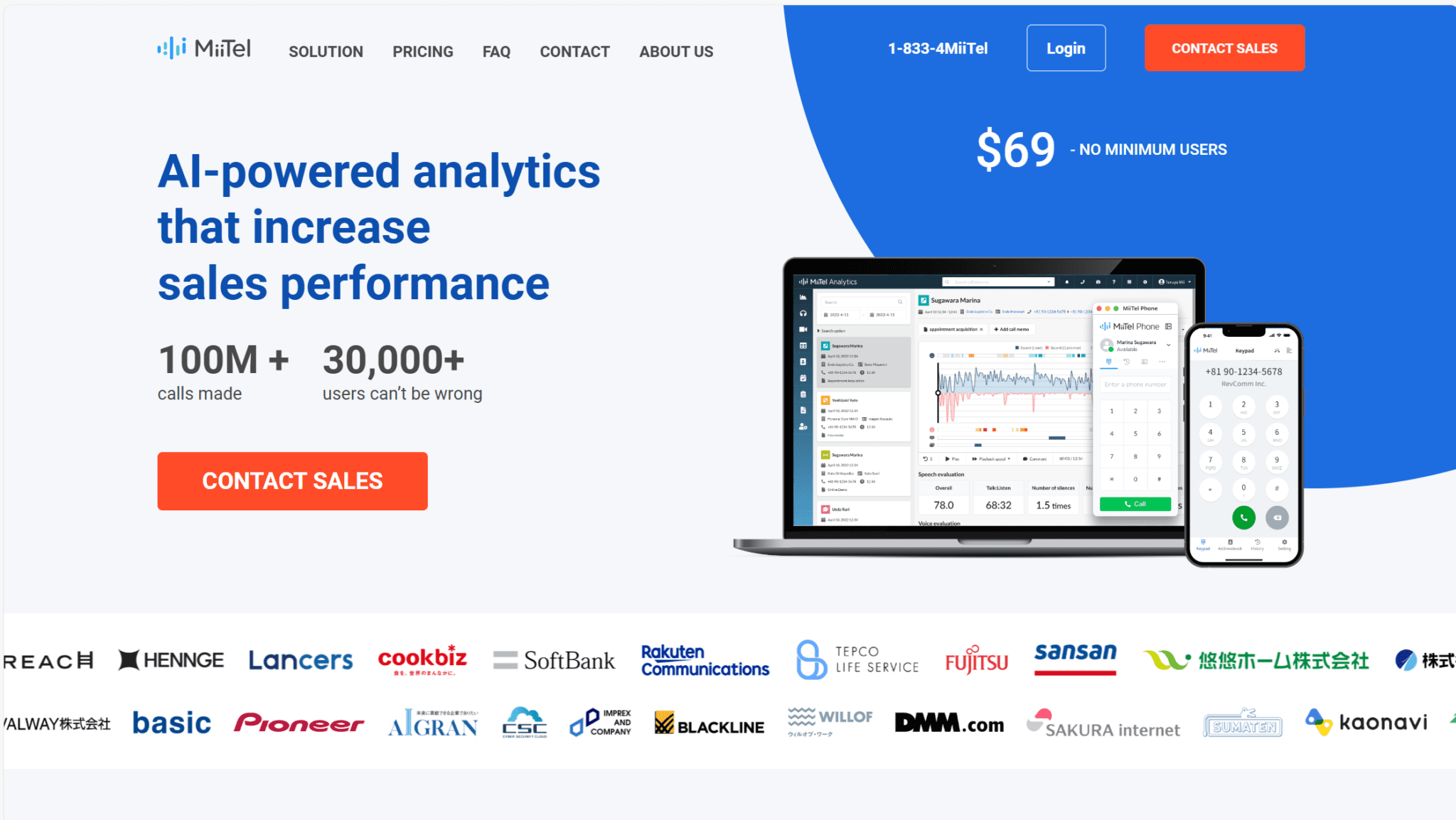
Founded by RevCom, the only Asian start-up listed in Forbes’ top 50 AI companies list for 2023, MiiTel enables you to record, transcribe, and analyze a caller’s voice.
It primarily focuses on sales teams, and dialing specifically. Designed to increase your conversion rates, MiiTel provides a powerful suite of features to help boost your overall sales team performance. Call recordings and transcriptions are just the start.
MiiTel empowers your team to analyze their sales calls, giving them deeper insights that can lead to new sales strategies. You can sync your sales call notes and summaries with your CRM of choice automatically, saving your reps valuable time doing tedious manual tasks.
CRMs aren’t the only integrations for MiiTel users either. It also integrates seamlessly with AI tools, analysis platforms, call center software, and much, much more. It also works well with plenty of collaboration tools, making it easy for your team to work on the same project.
The platform even offers sentiment analysis, allowing you and your team to get into the emotional weight behind the words of your potential customers. It also provides real-time AI analysis, helping you improve while you’re still on the call. This makes it a fantastic tool for sales training and onboarding.
However, one of MiiTel’s greatest strengths is also one of its greatest weaknesses. Its primary market is Japan. If Japan is your business’s target market, then MiiTel could be perfect for you. However, if your market is more global, or focused elsewhere, then you might need to look through some MiiTel alternatives.
MiiTel Pros
- Sentiment Analysis. The AI will analyze the speaker’s emotional tone, giving you even deeper insights into sales psychology.
- Comprehensive Analysis. MiiTel’s dashboard allows you to review your sales reps’ overall performance.
- Good Integrations. You can automatically sync your meeting notes to your CRM.
- Ease of Use. The learning curve for MiiTel is minimal so your team should pick it up in no time.
- Post-Call Analysis. After each call, MiiTel analyzes and scores your performance, helping with sales coaching and team development.
MiiTel Cons
- Niche Geographical Focus. As a sales dialer, MiiTel excels in Japan, and to a slightly lesser extent, Asia. It falls behind its competitors in European or American markets.
- No Video Conferencing. MiiTel only focuses on dialing. There is no video conferencing option.
- Inaccurate Transcripts. MiiTel’s transcripts are good enough, but they’re not the best. This can also impact the quality of the insights received.
- One Price Fits All. While a single price for the entire platform could be great for teams that will maximize its use, those who will only use a few features may feel like they’re not receiving enough value for money.
Pricing
MiiTel makes things incredibly simple: it’s $69 per user per month for all the features. That’s it.
Just to make things awkward, MiiTel requires you to have a sales call to access the platform, even though it’s just a flat rate pricing system.
MiiTel does offer a free trial with no credit card required, but it does not have a free plan for users to use continuously.
Is MiiTel Worth It?
What it really boils down to with MiiTel is your target market. If it’s Japan, or at the very least Asia, then MiiTel could be a fantastic option. If, however, your target market is anywhere outside of Asia, then there are MiiTel alternatives to look out for that will likely be a better fit for you and your business.
After all, there’s no point having the software if the accuracy of numbers and contacts is weak in your region. Everything else becomes a matter of preference, but the target market is key.
5 MiiTel Alternatives for Better Global Reach
1. tl;dv
tl;dv is less of a dialer and more of an AI meeting assistant. It makes up for this by having a broad array of sales features, from basic call recording all the way to advanced analytics and AI objection handling tips. Plus, for the cold-calling aspect, tl;dv has recently integrated with Aircall, making it possible for it to be used in a call center setting if necessary.
tl;dv is at its best in your MS Teams, Zoom, or Google Meet calls. Without spending a single cent, it can capture both audio and video with unlimited recordings, unlimited transcriptions, and unlimited AI moment summaries.
One of tl;dv’s stand-out features is multi-meeting intelligence. It completely changes the game for sales managers. Imagine all your sales reps have recorded all their sales calls for the week; with multi-meeting intelligence, you can prompt them all together as a combined database. What this means is tl;dv’s AI can identify trends and patterns across multiple calls simultaneously. tl;dv’s AI can analyze all of them simultaneously!
For example, let’s say you want to hear your most common prospect objections, you’ll get a full report covering all your team’s sales calls and a list of the most common objections in descending order. You’ll also get timestamps referring to each one so you can quickly and easily jump to the moment in question and listen to the voice of the customer.
This isn’t just for sales teams either. CS managers can use it to collect bug reports, UX researchers can use it to gather insights from their user interviews, and HR can use it during the interview process to efficiently review candidates.
tl;dv doesn’t stop there though. Schedule recurring reports and you’ll receive multi-meeting updates like these directly to your inbox on a regular frequency set by you. Just tell the AI what you need to know and it’ll do all the clever stuff itself. Want to compile a list of competitor mentions in customer support calls? Or perhaps a compilation of successful deal closes? Whatever it is, you need only select from a few smart filters and then let the magic happen.
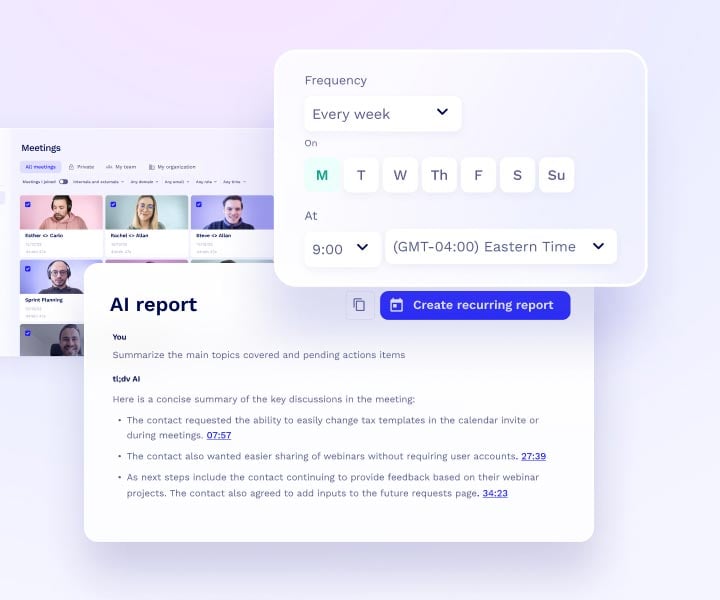
One thing you’ll be happy to know about tl;dv is that it has a strong market in Japan, as well as the U.S.A, Europe, and Brazil. In other words, it’s a global platform built for remote and asynchronous teams. It has a localized platform in 7 languages and can detect more than 40 languages during transcription. If you’re looking for MiiTel alternatives for a wider global reach, then tl;dv is ideal.
If you’re itching for a few more sales features, it won’t disappoint either. For example, you can use sales playbooks (as well as note templates for all your other teams) to monitor your reps’ performances. The speaker analytics dashboard lets you have a bird’s eye view over everything, from their talk-to-listen ratio to their amount of filler words used.
tl;dv includes all your favorite sales playbooks, including BANT, MEDDIC, SPIN, but it also includes many more. If you want something a little more tailored to your team or brand, you can edit these templates or create your own from scratch.
You can even build deep integrations with your CRM systems by creating a template that corresponds to the fields of your chosen CRM. This allows the data from your meeting notes to be ported over to your CRM automatically when the call ends. No questions asked.
It’s in this powerful sales section that you’ll also get AI objection handling tips. In short, tl;dv’s AI can train your reps to better handle objections so that they close more deals.
Finally, tl;dv integrates with 5,000+ tools so you can sync your meeting notes and conversational intelligence with tons of other platforms. These integrations strive to help you and your team save precious time that could be used more beneficially elsewhere.
tl;dv Pros
- Free AI Integration: tl;dv leverages first class AI to provide summaries, notes, and automatic speaker detection.
- Free and Instant Translations: tl;dv’s transcriptions are available in more than 40 languages for Zoom, MS Teams, and Google Meet. It also has a localized platform in 7 languages, making it an excellent choice for multinational teams.
- Incredible Free Plan: Unlimited free video recordings and transcriptions of Zoom, MS Teams, and Google Meet calls.
- Easy to Use: tl;dv’s sleek design makes it super easy for beginners and experts alike.
- Multi-Meeting Intelligence. Schedule recurring reports to get insights from multiple meetings at once, delivered straight to your inbox.
- Sales Coaching. Upgrade your sales team using insights from your sales calls. Improve objection handling and use templates or custom playbooks to personalize your coaching strategy.
- Timestamps and Tagging Features: Timestamp your meeting highlights to quickly jump back to specific moments in the call. It also features the ability to tag colleagues at specific meeting moments so they get an email with a link straight to their inbox.
- 5,000+ Integrations: Push timestamps and meeting clips directly to Notion, Slack, HubSpot, Salesforce, and 5,000+ more.
- Custom Meeting Templates. Create and edit meeting templates so that the AI takes notes exactly how you want it to. Sync these directly with your CRM of choice by creating a template with the CRM fields you wish to fill.
- Create Clips and Highlights: Scan your library and make clips and highlight reels to condense insights.
- Intuitive Library: Search your meetings library for keywords in transcripts to quickly find what you’re looking for.
- Concurrent Meetings. tl;dv’s AI can record and transcribe multiple meetings at the same time, making your life easier if you’re double (or triple+) booked.
tl;dv Cons
- Compatibility: Not yet available for Webex or BlueJeans.
- No Revenue Intelligence. While tl;dv provides ample sales coaching features, it doesn’t have any revenue intelligence features yet.
- Limited Dialing Features. tl;dv is built more for warm sales calls than cold calling. It doesn’t offer power dialing, business numbers, or autodialing features.
Pricing
tl;dv has a fantastic free plan that provides you with unlimited call recordings, transcripts, and AI summaries. It includes lots of other limited AI features too, but to maximize your sales team’s efficiency, you’ll need to opt for one of the paid plans.
The Pro plan costs $18 per user per month. This unlocks 5,000 integrations, unlimited “Ask tl;dv” prompts, and unlimited multi-meeting reports, among other things.
The Business plan will set you back $59 per user per month and unlocks sales playbook monitoring and AI coaching, AI objection handling tips, and multi-meeting speaker insights.
Depending on which region of the world you’re in, you can get up to a 40% discount on tl;dv’s paid plans!
Free Plan Features
- Unlimited video recordings and transcripts.
- Record Google Meet, Zoom, and MS Teams calls.
- Transcribe in 40+ languages
- Unlimited AI moment summaries
- 10x AI Meeting Notes
- 10x Ask tl;dv AI
- 10x AI Multi-Meeting Reports
- Slack, Email, and Calendar integrations
- Set timestamps and highlights
- Create and share clips
- Automatic speaker recognition
- 3 monthly uploads
For the full details of all of tl;dv’s plans, see here.
tl;dv vs MiiTel
tl;dv and MiiTel are certainly different tools, but that doesn’t mean that tl;dv can’t work as a MiiTel alternative. If you’re looking for a sales analytics and conversational intelligence platform then tl;dv is raising the bar across the entire industry. While it might not be tailored to call centers as much as MiiTel is, it can be used in the same way through some of its many integrations.
tl;dv is also a far better tool for warmer calls. MiiTel doesn’t work for video conferencing platforms like Zoom or MS Teams at all. This is a huge downside and it’s something where tl;dv excels. It records audio and video so you can take your conversational intelligence to the next level.
It’s also worth mentioning that MiiTel is primarily for sales and customer support. tl;dv can be used across all facets of your business. From product design to UX, HR to internal meetings, tl;dv is a flexible and versatile tool that can be used by every member of your business in one way or another.
Finally, MiiTel has a strong focus in Japan. tl;dv is based in Europe, but also has lots of users in the U.S.A, Brazil, and Japan. This makes it a brilliant tool for stronger global outreach, especially when combined with its excellent language support.
2. Gong
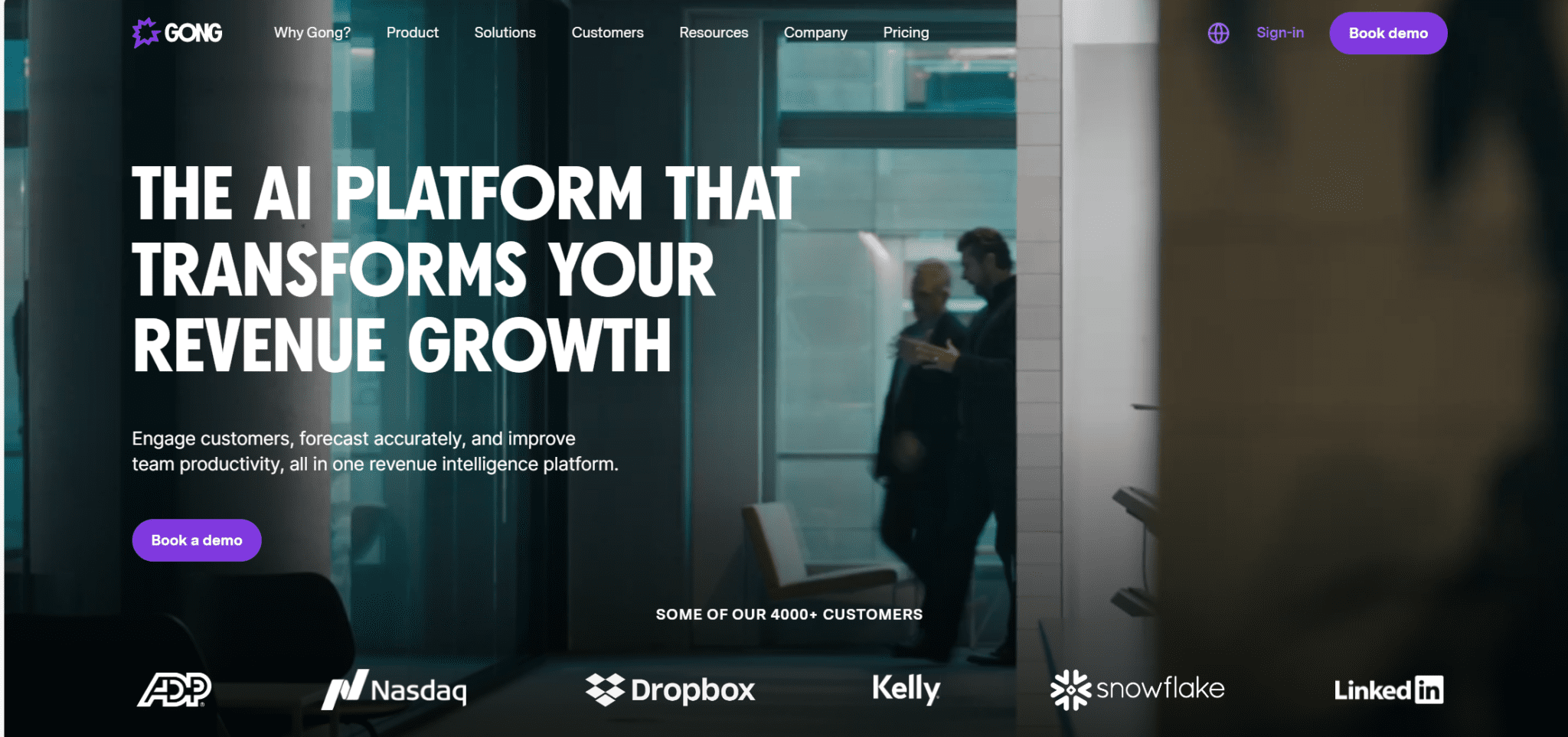
Gong is a revenue intelligence platform that does everything MiiTel does and more. It’s built with enterprise-scale sales teams in mind. If you’re currently using MiiTel, but want to swap for something that has more robust revenue intelligence features, Gong could be the ideal MiiTel alternative for you.
The biggest drawback for Gong is that it’s notoriously expensive. However, if you find you’re maximizing MiiTel’s features but still want more, then Gong could be the perfect replacement. It’s pricey for a reason: Gong has a comprehensive sales analytics dashboard, multi-meeting intelligence for identifying patterns and trends, the ability to prioritize deals and better manage your sales pipeline, and even state-of-the-art Battle Cards (live AI tips to help during sales calls).
Gong can schedule recurring reports, like tl;dv, empowering you to stay up to date on your team’s performance. It also has super powerful AI analytics to help reps identify high-potential leads before any calls have even taken place. Gong also has hundreds of integrations that allow you to seamlessly connect all your work tools into one automated workflow.
One drawback is that Gong doesn’t have any native dialing features. It does integrate with dialing platforms to be able to use its in-depth AI analysis on sales calls, and it can help you organize your revenue streams and pipeline with this knowledge in mind, but it doesn’t provide the actual dialer like MiiTel does.
Gong Pros
- Integrations. Gong has hundreds of integrations that make connecting your workspaces seamless.
- Revenue Intelligence. Gong’s state-of-the-art revenue intelligence allows you to forecast sales and help with deal execution.
- Sales Coaching. Gong offers custom playbooks, scorecards, templates, and objection handling training.
- Sentiment Analysis. Gong’s AI analyzes customer sentiment to bring you closer to closing the deal.
- Multi-Meeting Intelligence. Gong’s AI can analyze and interpret data from multiple meetings at once, providing you with optimal feedback across entire groups of meetings.
Gong Cons
- Expensive. Gong’s pricing is notoriously high.
- Heavy Sales Focus. If you aren’t going to maximize Gong’s sales features, you’re better off going elsewhere.
- Long-Winded Onboarding. To get access to Gong, you have to jump through a lot of hoops.
- Intrusive Recommendations. Some reviewers suggest that Gong’s recommendations on how to improve your sales pitch can be annoying and unwanted.
- No Built-In Dialing. Gong integrates with dialers but it doesn’t have the capacity to dial directly from the platform.
Pricing
Gong’s pricing is hidden behind a sales call. It’s thought to be in the region of $100 per user per month, depending on which features you require.
Gong does not have a free plan, nor a free trial. This is a bit of a weakness compared to other MiiTel alternatives which usually at least have a free trial.
Gong vs MiiTel
MiiTel and Gong are not quite direct competitors. As mentioned before, Gong does not have its own built-in dialing features. It’s more of a revenue intelligence and conversational intelligence platform that analyzes calls to help you improve your revenue. It does, however, integrate with dialers and video conferencing platforms so that it can gather data and provide cutting edge insights.
Gong scores an impressive 4.8/5 rating on G2 from almost 6,000 reviews. MiiTel cannot compete with Gong’s extensive features. However, it’s worth keeping in mind that Gong also has a higher price and a steeper learning curve. It might not be suitable for everyone.
3. Dialpad
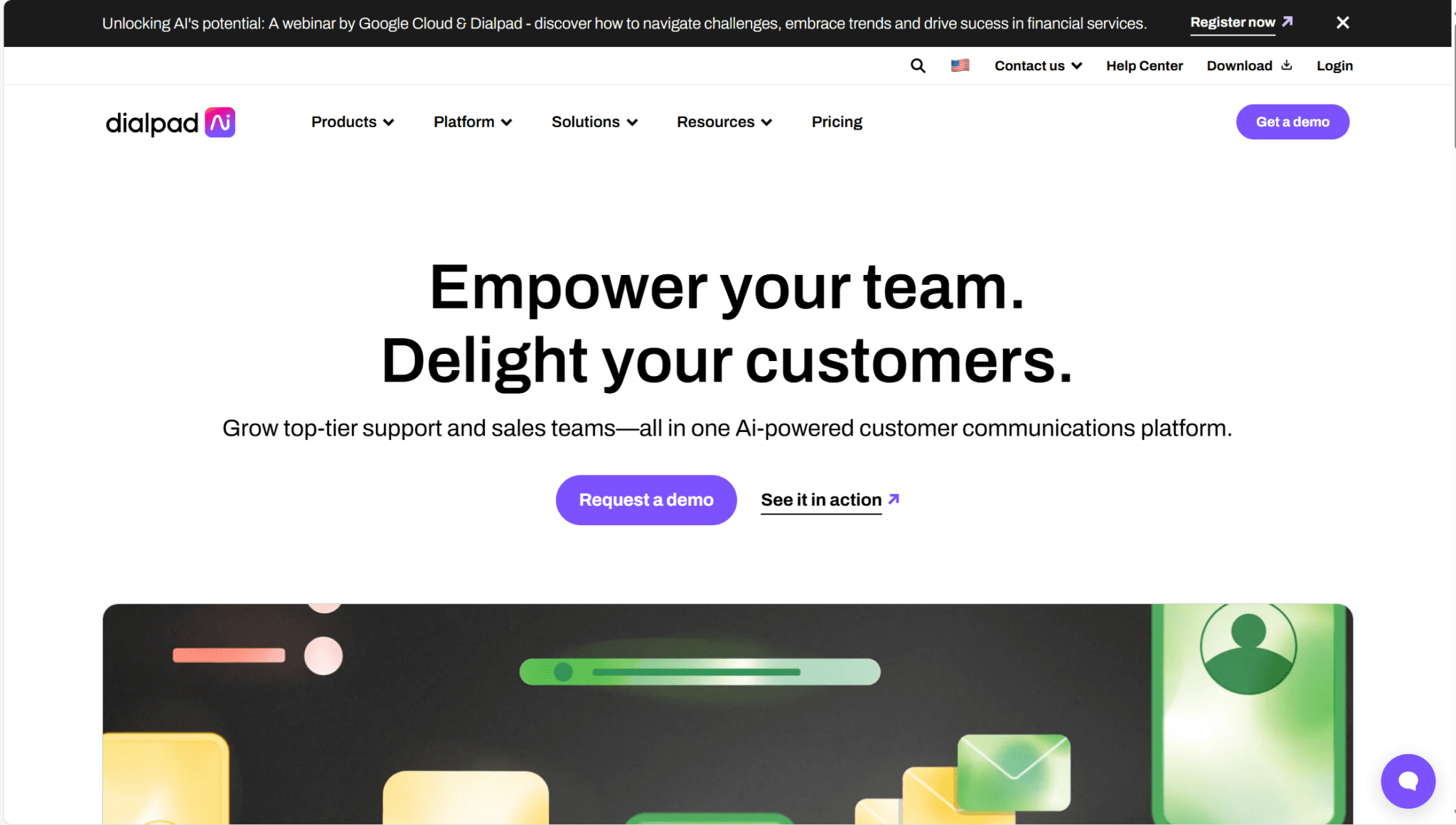
Dialpad is a cloud-based communication platform that integrates voice, video, messaging, and meetings into a single application. This makes it one of the top MiiTel alternatives, especially if you’re looking for a broader global reach. Dialpad leverages AI to enhance business communications and collaboration.
The Dialpad app works seamlessly on both desktop and mobile devices, empowering your team to send and receive calls from anywhere. Unlike MiiTel, Dialpad works with dialers for cold calling and as an AI meeting assistant for warmer video calls.
Dialpad Sell allows you to oversee your team’s adherence to sales playbooks. It provides a great opportunity for sales coaches to track and monitor progress. You can also guide your reps to make sure they hit specific points in each and every sales call. If something isn’t working, sales managers will be able to spot it and make changes quickly.
Dialpad’s pricing structure can be a bit confusing, especially compared to MiiTel’s one-price-fits-all model. There are also reports of the customer support being unable to quickly solve problems.
Dialpad Pros
- Unlimited Domestic Calling. Dialpad gives users unlimited calls within their country.
- Ease of Use. Dialpad is often praised for its simple UI. Teams can easily adapt without extensive training.
- Unified Communications. Dialpad combines voice, video, SMS, and instant messaging into a single platform, reducing the need for multiple tools.
- Quality Integrations. Dialpad integrates with lots of popular documentation tools and CRMs.
- Call From Anywhere. With both a desktop app and mobile app, users can take and receive calls from anywhere.
- Real-Time Transcription. Dialpad’s real-time transcription is excellent for teams that prioritize instant transcription access.
- Sentiment Analysis. Dialpad analyzes user sentiment to help you make data-backed decisions.
Dialpad Cons
- Confusing Pricing Structure. There are four separate types of plans, each with two or three tiers, making a grand total of eleven (11) plans. It can be overwhelming to decide which one you need.
- Occasional Call Quality Issues. Some users report occasional call drops or degraded audio quality at certain times.
- Weak Customer Service. Many users report the customer service being difficult to find or slow in responding.
- Advanced Features Have a Learning Curve. Dialpad’s advanced features might be a little too complex for small businesses.
Pricing
Buckle up: Dialpad’s pricing model is enough to make you dizzy. It’s split into four categories: Dialpad Connect, Dialpad Meetings, Dialpad Support, and Dialpad Sell. You can only pick one. Each of these Dialpad solutions is broken into tiers.
All prices listed below are per user, per month, when billed annually.
Dialpad Connect
For Dialpad Connect, you have Standard ($15), Pro ($25), and Enterprise (Custom).
These plans provide unlimited calling, voicemail transcriptions, AI meetings, real-time analytics and reporting, basic Google and Microsoft integrations (in Standard) and CRM integrations (in Pro).
Dialpad Meetings
In Dialpad Meetings, there are two options: Free ($0) and Business ($15).
The Free plan lets you host up to 10 participants for a maximum of 45 minutes at a time. It also unlocks unlimited audio recording.
The Business plan lets you host up to 150 people for up to 5 hours. This gives you AI meeting transcriptions, automatic action item capture, automated post-meeting summaries, unlimited video recordings, and a couple other features.
Dialpad Support
Next up is Dialpad Support. Here, you have Essentials ($80), Advanced ($115), and Premium ($150).
These plans unlock IVR (Interactive Voice Response), ACD (Automatic Call Distribution), call recording, screen recording, AI moments, transcriptions, video meetings, integrations, and even AI scorecards.
Dialpad Sell
Dialpad Sell provides three more options: Essentials ($39), Advanced ($95), and Premium ($150).
These provide you with a business phone number, advanced call controls, AI moments, a company dictionary, call transcription, video meetings, integrations, coaching team, IVR, ACD, power dialer, AI scorecards and playbooks, and more.
You can try out any Dialpad plan for 14 days for free.
Dialpad vs MiiTel
Dialpad is one of the best MiiTel alternatives as it offers everything MiiTel offers and more. It has a broader global reach, more integrations, a more user-friendly experience, and stronger AI functionality.
For example, Dialpad provides real-time transcription, analytics, and even video call recording, transcription, and conversational intelligence. MiiTel tends to focus more on the voice call analysis side of things, but this leaves it stuck in one section of the sales funnel, where Dialpad is useful throughout the whole thing.
4. JustCall
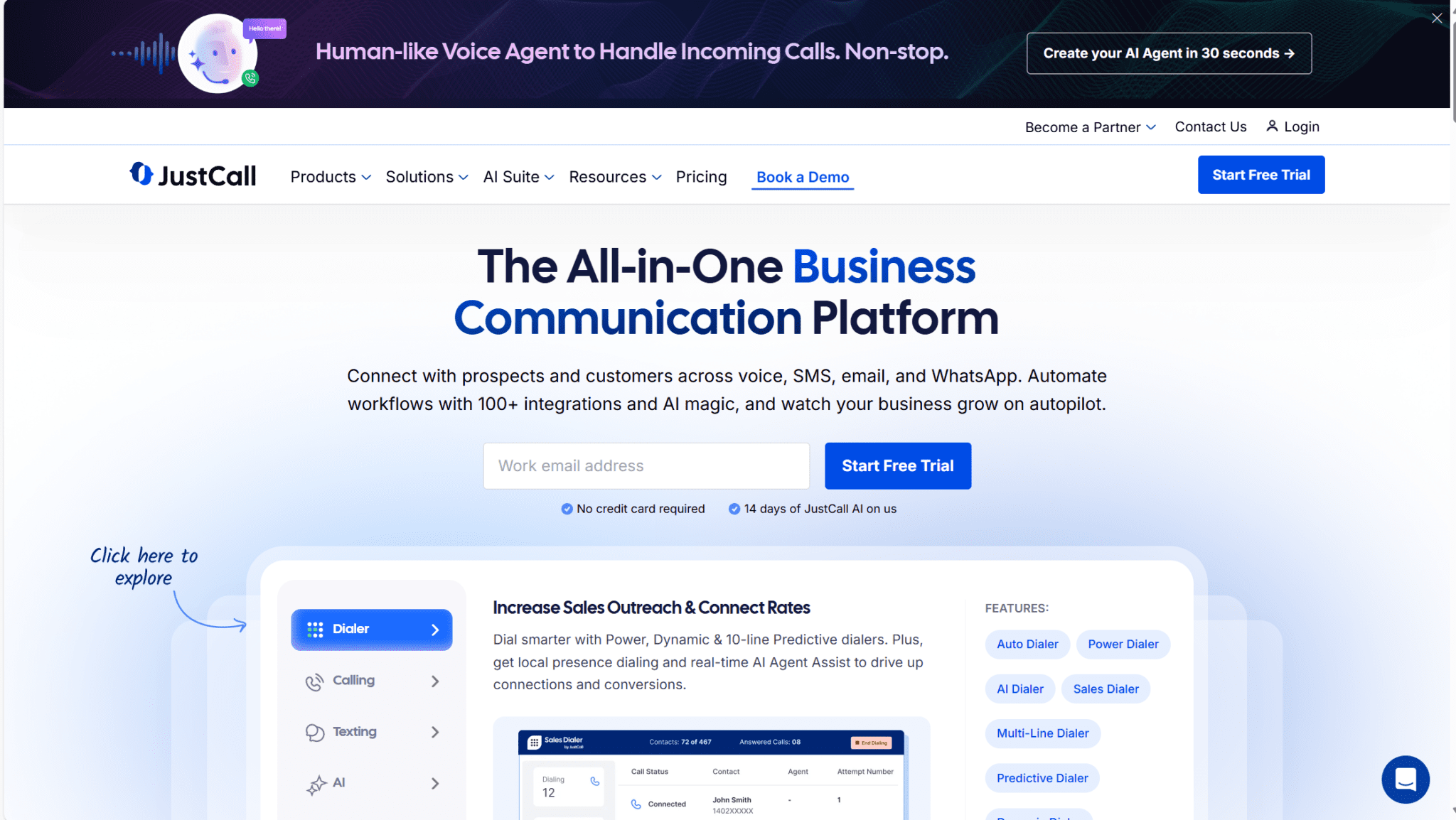
JustCall is a cloud-based phone system and call center software designed to streamline business communications. Like MiiTel, it offers a bunch of features for managing calls, SMS, and integrating with various CRM and helpdesk platforms. All of this is designed to enhance both sales and customer support operations.
It makes for a great alternative to MiiTel for those looking for better global reach too. JustCall provides local, international, and toll-free numbers in over 70 countries.
With autodialing, power dialing, and predictive dialing, JustCall automates outbound calling campaigns and saves your sales reps a lot of time. Additionally, you can use JustCall to create bulk SMS messaging campaigns, even using AI to generate the message in the first place.
JustCall integrates with over 100 CRMs and business tools, making it easy to streamline workflows, foster a sense of collaboration, and keep everything organized.
JustCall’s AI is also capable of providing live assistance, sales coaching, and call scoring. It also provides real-time transcriptions which enhance customer interactions and help you stay deep in the conversation.
JustCall Pros
- Intuitive UI. Users report that JustCall’s user interface is easy to learn and navigate.
- Detailed Analytics. Analyze your sales team’s performance with important metrics and KPIs from JustCall’s dashboard.
- Global Reach. JustCall provides local, international, and toll-free numbers in more than 70 countries.
- Great Dialing Features. JustCall facilitates auto dialing, power dialing, and predictive dialing, automating your outbound calling campaigns.
- SMS Options. JustCall provides the option to run SMS campaigns too.
- Good Integrations. Integrate with over 100 CRMs and business tools for increased efficiency.
- Sales Coaching and Call Scoring. JustCall’s AI monitors your sales team and constantly finds ways they can improve.
- Sentiment Analysis. Like MiiTel, JustCall enables you to dive into the tone behind a prospect’s words.
JustCall Cons
- Call Quality. As with all big dialers, there are often reports that calls often get disrupted.
- Integration Limitations. While they have an extensive array of integrations available, some users require deeper and more seamless connections to automate everything from start to finish.
- Pricing Structure. JustCall’s pricing structure is split into 9 categories, with optional add-ons as well. This feels a bit excessive.
Pricing
Like Dialpad, JustCall has a bit of a confusing set-up when it comes to pricing. It’s divided into three overarching sections: Base Suite, AI Suite, and Sales Suite.
All quotes displayed below are per user, per month, when paid annually.
Base Suite
For the Base Suite, you’ve got 4 different options: Essentials ($19), Team ($29), Pro ($49), Business (Custom).
The Essentials plan gets you a local number in 70+ countries, free calling and SMS credits, call recording and voicemail, basic analytics, and Google Calendar and Slack integrations.
Teams provides everything in Essentials, plus an AI call handling agent, AI call transcriptions and summaries, messaging suite (for SMS and WhatsApp), 100+ CRM and data integrations, team performance analytics, and various APIs and workflows.
Pro unlocks all of the above, as well as power dialing, bulk SMS campaigns, live call monitoring, intelligence call routing, advanced analytics and reporting, and higher API limits, among other things.
Finally, the Business plan takes things up a notch with unlimited calling and SMS, SSO, enterprise-grade SLA, personalized onboarding, dedicated success manager, and maximum API limits. It also provides you with a dedicated support line.
AI Suite
The AI suite includes everything from the Base Suite, but it’s more focused on AI-powered coaching and training. There are three plans: Team Plus ($49), Pro Plus ($89), and Business Plus (Custom).
Team Plus provides everything in the Base Suite Team plan, as well as SMS co-pilot for tone analysis and rephrasing, extra transcriptions and summaries. the ability to track specific key phrases in your calls, and add comments to the transcript for better coaching.
The Pro Plus plan includes everything from the Pro plan, in addition to lite versions of the real-time agent assist and AI-powered script compliance, both manual and AI-powered call scoring, and sentiment analysis.
The Business Plus plan includes all the features from the regular Business plan, plus the full version of the real-time agent assist and AI-powered script compliance. It also unlocks real-time transcriptions and a multi-channel notetaker.
Sales Suite
The Sales Suite is for those who will maximize JustCall’s feature set. There are two plans: ReachMax and ReachMax Plus. Both plans require a sales call to get an accurate quote.
In short, ReachMax includes all the features mentioned above. ReachMax Plus includes everything in ReachMax, as well as the Business Plus features and AI objection handling tips.
JustCall vs MiiTel
JustCall is one of the best MiiTel alternatives. Not only does it have numbers in more than 70 countries, making it a global force, it also has all the snazzy dialing features you could wish for.
It scores a respectable 4.3/5 on G2 from just over 2,000 reviewers. MiiTel, on the other hand, isn’t ranked.
All in all, both JustCall and MiiTel offer robust cloud telephone solutions, but JustCall distinguishes itself with a wider range of features, extensive integrations, and a broader global reach.
5. Aircall
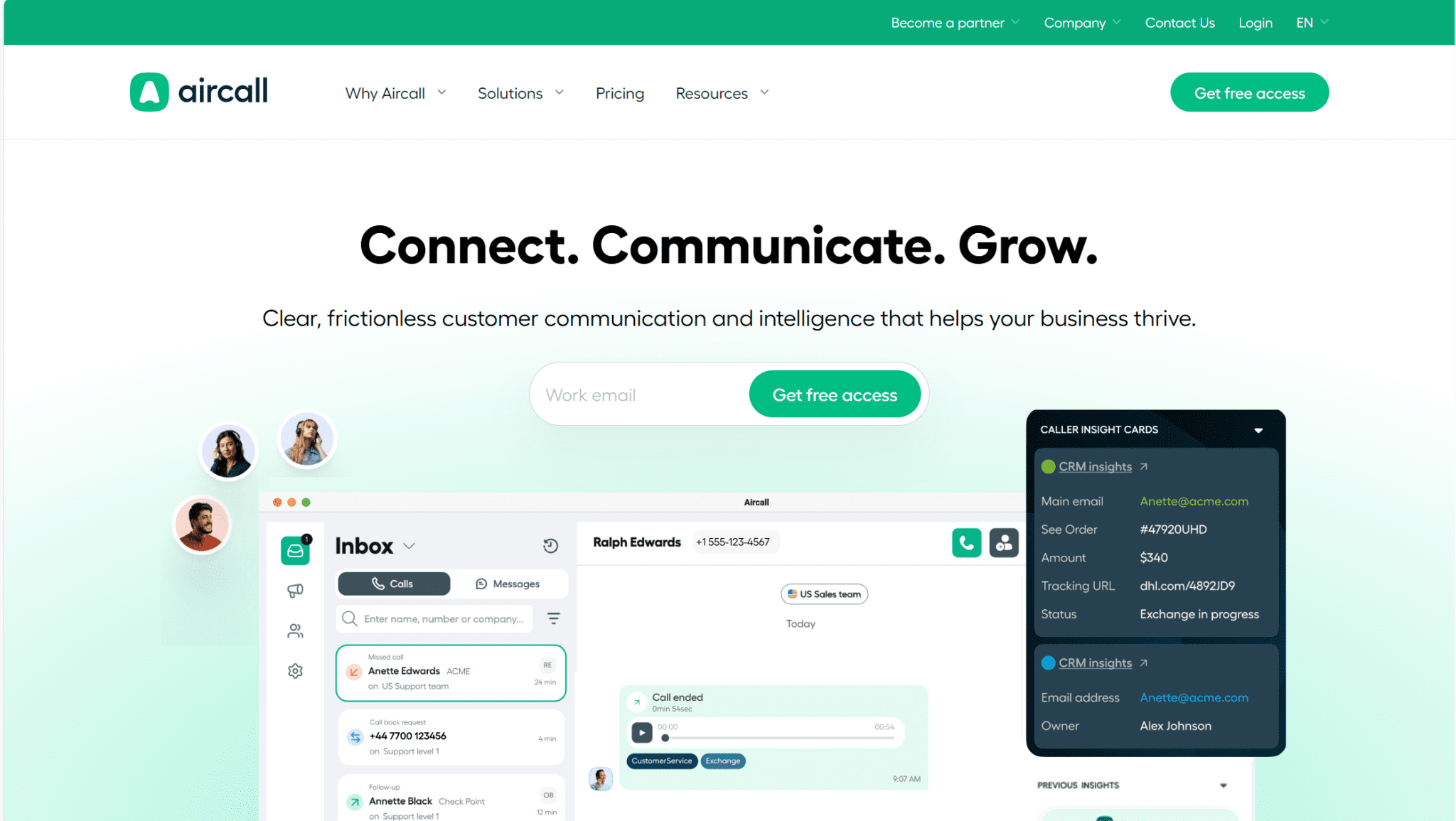
Aircall is another strong MiiTel alternative that works as a cloud-based call center and phone system. It primarily focuses on creating clear and concise communication between sales reps and potential customers. Packed with features for conversational intelligence, Aircall encourages you to understand your prospects on a deeper level.
There are plenty of integrations available with Aircall, allowing your team to quickly automate workflows that would usually take up valuable time. You can sync your meeting notes with your CRM of choice so that it gets filled automatically after each sales or support call.
Like most MiiTel alternatives, Aircall has a real-time analytics dashboard that helps managers understand what’s going well and what could be improved. It gives a great high-level view of your sales strategy.
Unlike MiiTel, which is focused mostly on cold calling and first contact, Aircall helps you communicate with your customer through their entire lifecycle. It works as a support platform just as much as a sales one.
Aircall also comes with sentiment analysis so that you can analyze your prospect’s tone and emotions to better understand their position. It provides full searchable transcripts so you can always find what you’re looking for from past meetings.
One big downside with Aircall is the amount of negative reviews it has for its lack of customer support, particularly with problems regarding cancellations.
Aircall Pros
- Automation and Integrations. It seamlessly integrates with all your favorite CRMs and helpdesk tools.
- Real-time Analytics Dashboard. Managers will have a field day with the analytics dashboard, which helps train teams and enhance productivity.
- Powerful Conversational Intelligence. From AI summaries to tracking trends across calls, you’ll be able to make data-driven business decisions with clarity.
- Sentiment Analysis. Dive into the emotional tone and body language that sits behind the prospects’ words.
- Power Dialing. Automate and speed up the dialing process so your reps can get more done in less time.
Aircall Cons
- Bad Customer Support. For an organization that aims to bring their clients closer to their customers, they sure do get a lot of complaints about the customer support.
- Problems with Cancellations. This is always a bit of a red flag. Many users have reported problems with cancelling their plan, some claiming that Aircall is outright deceptive.
- Connection Issues. Lots of users claim that the dialer struggles to connect or that only one side can be heard.
Pricing
Aircall’s pricing structure is a bit overwhelming at first. There are a number of plans, but there are also separate add-ons that aren’t included in the plans themselves. There is no free forever plan.
Aircall’s Essentials plan will set you back $30 per license per month. This unlocks 100s of integrations and API access. You’re allowed unlimited calls within your specific region (USA and Canada for example), you can also send and receive SMS, and make unlimited simultaneous outbound calls. This plan also provides a softphone for desktop, Android, and iOS.
The Professional plan costs $50 per license per month. This includes a Salesforce integration, manual tagging, advanced analytics and live monitoring. It also provides more advanced sales features like power dialers and voicemail drops. Advanced support features like queue call back and smart routing are also unlocked here.
The Custom plan requires you to reach out to a sales rep to discuss the price and customization level.
There are also two add-on licenses. If you want to get conversational intelligence and record and transcribe your calls, you’ll need the Aircall AI add-on. This is $9 per license. If, however, you want the Analytics add-on, you’ll need to fork out an additional $15 per license.
Aircall vs MiiTel
MiiTel and Aircall are similar tools, but MiiTel has a stronger focus on cold calling. It also has a narrower target market: Japan.
Aircall is a communication platform for the entire customer journey. It doesn’t just work for dialing, but you can also record and transcribe video calls for warmer interactions, either as a prospect or a customer.
Both tools have a strong focus on sentiment analysis, making them capable of providing top quality conversational intelligence. However, Aircall has more to offer on this front as it’s able to join more calls and gather more data.
The Verdict: Which of These MiiTel Alternatives is Best?
Choosing a MiiTel alternative that’s right for you comes down to your specific business needs. Are you primarily using it for cold calling, or do you want a tool that’s more versatile? Is your target market the issue?
Figure out why you’re not happy with MiiTel in the first place, then look through our list of MiiTel alternatives and browse their pros and cons. You’ll find a platform that solves your biggest problem.
In short though, tl;dv is a fantastic tool for those looking for cutting-edge tech for warmer calls. It mostly works as an AI meeting assistant, but dialing integrations are in the pipeline, with the first (Aircall) already here. It’s also great because of its versatility. It can be used by your entire organization, not just the sales team.
However, if you are sales-heavy and want to pour in resources to transform your revenue growth, then Gong is one of the best MiiTel competitors you could wish for. It works with dialers but it’s also a juggernaut in video calls.
Dialpad, JustCall, and Aircall are all MiiTel alternatives that directly compete with each other. However, these three have far greater global reach than MiiTel does. MiiTel is very Asia-focused, Japan in particular. This isn’t ideal if you’re using the platform to get international phone numbers. You want a broader global reach. All the alternatives on this list provide this, but these three are the ones most likely to seamlessly replace MiiTel.
Whichever tool you choose, best of luck on your future sales calls! May the merchant gods shine in your favor.





